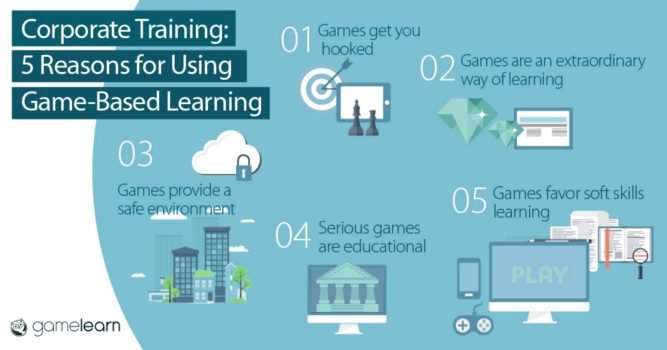Learning methods play a key role in the level of interest of students in corporate training. Both children in schools and adults in their companies, feel frustrated whenever they fail to maintain the necessary motivation to complete a specific training. We all need to acquire skills and expand our knowledge to grow and develop, personally and professionally.
Most of us wish to learn and, what’s more, we need to learn. Game-based learning, i.e. learning through playing, offers new and effective ways to enhance the learning process. Those responsible for the training and development of thousands of companies around the world know that very well. These are the reasons why they are beginning to overcome their fear of implementing gamification programs in their organizations:
1. Games get you hooked
The more interest a student has in learning, the better they will do it. Serious games offer an appropriate level of challenge to each participant so as to maintain motivation. Gamification programs for skill development keep a balance between the skills of the student and the challenge posed by the game. Thus, difficulty increases depending on the student’s progress, providing constant feedback for a better understanding and engagement.
2. Games are an extraordinary way of learning
More and more companies are implementing game-based learning products as part of their training programs. Those who have already done it have experienced the benefits of gamification: higher performance, greater memory of that which is learnt, better practical knowledge and understanding, as well as high satisfaction and self-confidence rates in employees.
Studies (like this one from the University of Colorado-Denver) show that games do work. Part of this success is also due to the constant and personalized feedback received by students, allowing them to measure their own progress. This way, employees are an active part of the learning process, while managers also have tools to assess the progress of the training.
3. Games provide a safe environment
Those responsible for company training want to better train their employees. The greatest danger of learning in general, and soft skills in particular, is the risk involved in getting it wrong. Mistakes cost money and create negative experiences among customers, not to mention the damage they can cause to poorly trained employees.
However, mistakes are an important part of any learning process. So how to learn without taking risks? This is where games succeed. Simulators offer a virtual environment for decision-making and the safe practice of their content. Students learn about real situations through practice and companies avoid the harm involved in mistakes.
4. Serious games are educational
Serious games are more than games. They are serious games for learning and, as such, they are rooted in educational theories whose basis is knowledge and information. Decision-making and interaction in an environment that emulates reality allows for a better learning, because they take the student to a real context where to apply what’s being learnt.
Game-based learning creates experiences that mirror real-life situations on which to apply knowledge. That’s why they are active ways of learning that require action from the student and that’s why they are so effective.
5. Games favor soft skills learning
Games help develop the affective and cognitive potential, domains responsible for the so-called “soft skills”, so valuable in the world of corporate training. Soft skills are not learned with theory or books (they are not technical knowledge), but they require a different learning process, based on practice and storytelling.
Serious games make the learning of these functions feasible, as they allow students to interact with different real-life situations where they find themselves involved in first person. That experience allows for an immediate answer and the opportunity to learn on the fly. The result is a more effective, satisfying and productive learning for both the student and the company.
What would you like to learn through a videogame?





